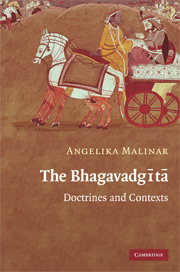Book contents
- Frontmatter
- Contents
- Acknowledgements
- List of abbreviations
- Introduction
- 1 The Bhagavadgītā in the history of research
- 2 Debates over war and peace in the Udyogaparvan of the Mahābhārata
- 3 The doctrines of the Bhagavadgītā
- 4 The doctrines of the Bhagavadgītā: summary and systematic considerations
- 5 Historical and cultural contexts
- Bibliography
- Index
1 - The Bhagavadgītā in the history of research
Published online by Cambridge University Press: 06 January 2010
- Frontmatter
- Contents
- Acknowledgements
- List of abbreviations
- Introduction
- 1 The Bhagavadgītā in the history of research
- 2 Debates over war and peace in the Udyogaparvan of the Mahābhārata
- 3 The doctrines of the Bhagavadgītā
- 4 The doctrines of the Bhagavadgītā: summary and systematic considerations
- 5 Historical and cultural contexts
- Bibliography
- Index
Summary
The BhG has incited an apparently endless stream of publications. However, only a few have been influential, and much of the literature seems redundant, since it is rarely based on previous research. It seems that scholars start each time anew when they turn to this text, as pointed out by Minor (1987: 150, note 13): ‘It is extremely unfortunate that most of what is being written on the Gītā has been written before. There is a noticeable lack of citation of secondary literature in studies of the Gītā.’ Nevertheless, major publications and developments in the field can be discerned, which can be classified according to two dominant approaches. Whereas one group of scholars, the ‘analysts’, follows methods of textual criticism that are aimed at reconstructing the Gītā's textual history, others, the ‘unitarians’, follow a holistic approach and take the extant text as a meaningful whole and interpret it according to different theoretical perspectives. Since both methods were regarded as mutually exclusive, they were only rarely employed together as is done in the present work. The following critical survey of major and original publications will not only present a survey of research on the text, but is also intended to establish a referential framework for the subsequent analysis of the text.
- Type
- Chapter
- Information
- The BhagavadgitaDoctrines and Contexts, pp. 17 - 34Publisher: Cambridge University PressPrint publication year: 2007



